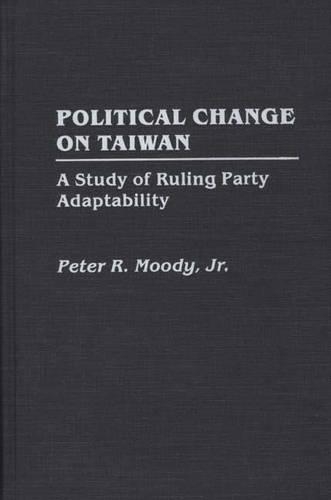
Political Change on Taiwan: A Study of Ruling Party Adaptability
(Hardback)
Publishing Details
Political Change on Taiwan: A Study of Ruling Party Adaptability
By (Author) Peter Moody
Bloomsbury Publishing PLC
Praeger Publishers Inc
30th November 1991
United States
Classifications
Tertiary Education
Non Fiction
951.249058
Physical Properties
Hardback
224
Description
This volume surveys recent Taiwan politics, mainly from the perspective of the ruling KMT party. It includes analysis of recent changes in the party itself and also in the relations between the party, the opposition, and society generally. There is also simple statistical analysis of rank-and-file KMT activists and of the 1989 national elections. The work's theoretical centre is the question of democratization, with an attempt to explore an anomaly: the KMT is, apparently, an example of a ruling hegemonic party that has undertaken a genuine liberalization, instituting changes that would put its rule at risk.
Reviews
Moody (Notre Dame, author of three previous books on China) offers a chronological description of regime transition based not on research over a long period but on secondary sources. Asking how an entrenched authoritarian ruling party has liberalized its rule, he begins by describing, within a brief history of Taiwan, the development of the Kuomintang (Chinese Nationalist Party, KMT). He focuses on individual leaders (particularly Chiang Ching-Kuo and his reforms) and factions in the party leadership, and discusses the intersection of party, government, and society through detailed analysis of party membership and a "preliminary ecological analysis," which correlates the KMT vote with characteristics of the population. He concludes by reviewing the external context and recent developments, especially the 1989 elections. Cautiously optimistic, Moody believes the KMT will fragment as democratization proceeds, and that tension will develop between further democratization and eventual reunification with China.-Choice
"Moody (Notre Dame, author of three previous books on China) offers a chronological description of regime transition based not on research over a long period but on secondary sources. Asking how an entrenched authoritarian ruling party has liberalized its rule, he begins by describing, within a brief history of Taiwan, the development of the Kuomintang (Chinese Nationalist Party, KMT). He focuses on individual leaders (particularly Chiang Ching-Kuo and his reforms) and factions in the party leadership, and discusses the intersection of party, government, and society through detailed analysis of party membership and a "preliminary ecological analysis," which correlates the KMT vote with characteristics of the population. He concludes by reviewing the external context and recent developments, especially the 1989 elections. Cautiously optimistic, Moody believes the KMT will fragment as democratization proceeds, and that tension will develop between further democratization and eventual reunification with China."-Choice
Author Bio
PETER R. MOODY is Professor of Government and International Studies at Notre Dame. He is the author of Chinese Politics after Mao (Praeger, 1983) and Political Opposition in Post-Confucian Society (Praeger, 1988).
